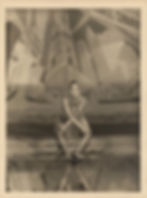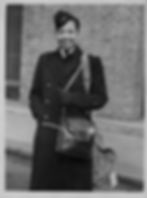Josephine Baker's sparkle.
- Mar 28, 2024
- 3 min read
Updated: Apr 16, 2024

Josephine Baker was a cultural icon and influencer--she was a whole vibe.
Imagine going from a childhood in poverty to blazing stages of Paris with stardom, to then entering the world of espionage. She needs a film of Marvel quality so we can marvel at her qualities--she is superhero quality.
Though France became her beloved home until her passing in 1975, Josephine never forgot the fight for equality raging across the Atlantic. Invited to perform on American stages, she'd only agree if segregation wasn't in the picture. Despite her international acclaim, racism wasn't a foe she'd entirely conquered. Sadly, even Josephine Baker, the dazzling entertainer, wasn't immune to its sting. If anyone (white people) wondered just how spectacular or just how "good" a person of color had to "act" in order to be accepted as a human in society and avoid the brutality of racism--this is a good gauge.
I would pay a good amount to go back in time just to experience her stage presence. It seems as if she carried that sensational aura through her entire life. Even as a spy.
Let me tell you a little bit about Josephine Baker's spy phase.
The 1940 Nazi occupation of France in 1940 ignited a fire within Josephine. The love she held for her adopted home clashed fiercely with the hateful ideology of the Nazi regime. Her powerful voice and captivating dance routines weren't just for entertainment anymore; they ended up becoming tools for fundraising to bolster the French army.
After the fall of Paris, Josephine retreated to her southern chateau, offering refuge to those displaced by the war and soon, she found herself drawn into the clandestine world of espionage. Jacques Abtey, a French counterintelligence officer, recognized Josephine's unique position as a celebrity. He approached her with a covert mission: to become a weapon against the enemy.
Video of Josephine Baker arriving at The Hague, Netherlands.
With her fame and skills, Josephine could navigate occupied France with ease, effortlessly mingling with German, Italian, and Japanese officials at social gatherings and nightspots. As she charmed and flattered them, her keen eyes and ears absorbed valuable secrets – troop movements, enemy strongholds, even vital details about Axis-controlled ports and airfields.
But whispers reached German ears that Josephine harbored enemies of the Reich. A tense visit from German officials left her shaken. It was time to leave. She and Abtey fled, carrying a secret arsenal of their own – dozens of classified documents meticulously written in invisible ink on her sheet music. Can you imagine?! This is real life.
Exile couldn't dampen Josephine's spirit. From Lisbon to North Africa, she continued to serve the French Resistance under the guise of an international tour. Her travels became intel-gathering missions, yielding crucial information on tides, beaches, and enemy defenses. These details proved invaluable in planning Operation Torch, the Allied invasion of North Africa in late 1942.
When Paris was finally liberated in 1944, Josephine returned a proud woman, adorned with the uniform of the French Air Auxiliary Lieutenant. The city's suffering under Nazi rule stirred her deeply. She readily sold her possessions, channeling the proceeds into food for the city's most vulnerable. Her wartime service was a selfless act of courage, never motivated by personal gain.

In recognition of her heroism, General Charles de Gaulle, leader of the Free French Forces, personally bestowed upon her the Croix de Guerre, the Rosette de la Resistance, and the prestigious Chevalier de Legion d'Honneur – France's highest order of merit. Josephine Baker, the entertainer, the activist, the spy, had become a true heroine of the French Resistance.
That National World War II Museum and the French Ministry of Culture websites will have loads more information about Josephine, because I'm sure I left some information out.

Let's try to summons some of Josephine sparkle today.
Peace,
MA







